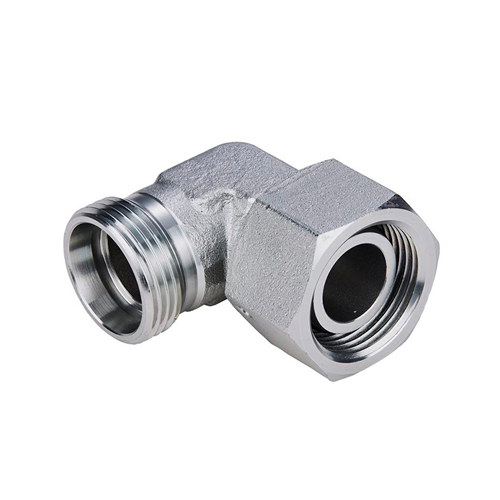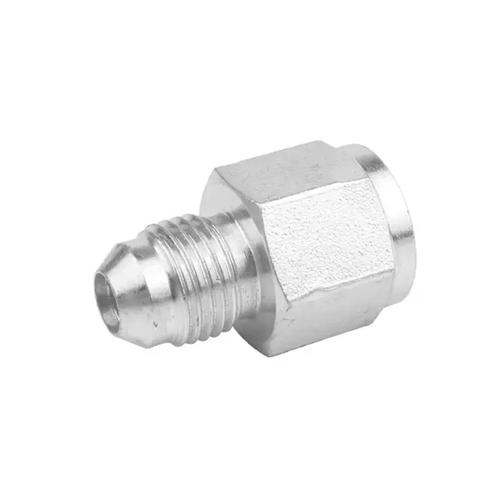Hydraulic hose fittings are essential for the safe and efficient operation of heavy equipment. These fittings connect hoses to hydraulic systems, allowing fluids to move through equipment with the necessary force and precision. When hydraulic hose fittings are of low quality, they can compromise the performance, safety, and longevity of heavy machinery. Hoson, a trusted provider of high-quality hydraulic components, understands the critical role that durable, high-standard hose fittings play in heavy equipment. This article explores the disadvantages of using low-quality hydraulic hose fittings, compares Hoson’s fittings to competitor products, and delves into industry trends emphasizing quality and safety.
Key Disadvantages of Low-Quality Hydraulic Hose Fittings
Low-quality hydraulic hose fittings may seem like a cost-saving choice initially, but they can lead to costly and dangerous issues down the line. Here are the main drawbacks of opting for substandard hydraulic hose fittings in heavy equipment:
Increased Risk of Leaks and System Failures
Hydraulic hose fittings play a critical role in maintaining fluid pressure. Low-quality fittings often lack precision in their manufacturing, leading to poor seals and an increased risk of fluid leaks. In heavy equipment, such leaks can cause a sudden drop in pressure, resulting in reduced performance, potential equipment damage, and even dangerous failures. High-quality fittings, like those provided by Hoson, are manufactured with precise tolerances, ensuring a secure, leak-free connection.Reduced Equipment Efficiency and Performance
Heavy machinery relies on optimal hydraulic pressure to function effectively. Low-quality fittings are more prone to wear and tear, potentially leading to restrictions in fluid flow and pressure drops over time. This can result in sluggish equipment response and poor performance. High-quality fittings from Hoson are designed to withstand the demands of high-pressure systems, ensuring that equipment runs smoothly and at peak efficiency.Frequent Maintenance and Downtime
Low-quality hydraulic hose fittings tend to fail more frequently, requiring more maintenance and part replacements. For heavy equipment operators, this means costly downtime that impacts productivity. By choosing high-quality fittings, equipment owners can reduce the frequency of repairs, lowering maintenance costs and minimizing disruptions to operations.Higher Risk of Environmental Damage
Low-quality fittings that are prone to leaks can lead to hydraulic fluid spills, posing a risk to the environment. In industries such as construction and agriculture, spills from leaking fittings can contaminate soil and water sources, leading to environmental violations and cleanup costs. Hoson’s high-quality hydraulic fittings are manufactured to resist leaks, helping to protect both the environment and equipment operators.Safety Hazards for Operators
Hydraulic systems operate under high pressure, and a sudden failure due to low-quality fittings can pose serious safety risks to operators. In the worst cases, ruptured hoses or fittings can lead to hydraulic fluid spraying at high pressure, which may cause injuries or damage nearby equipment. Hoson’s high-quality fittings undergo rigorous testing to meet safety standards, significantly reducing the risk of equipment malfunctions that could harm operators.Shorter Component Lifespan
Low-quality fittings wear out faster due to inferior materials and manufacturing processes, resulting in a shorter lifespan for both the fittings and the connected hydraulic hoses. This leads to frequent replacements and higher costs over time. Hoson’s fittings are built from durable materials designed for longevity, ensuring a reliable connection that lasts even in demanding conditions.

Comparison of Hoson’s Hydraulic Hose Fittings with Peer Products
Hoson is known for producing high-quality hydraulic hose fittings that withstand the pressures and demands of heavy equipment applications. Here’s a comparison of Hoson’s hose fittings with competitor products, focusing on durability, safety, and cost-effectiveness.
Comparison of Key Features of Hoson vs. Competitor Hydraulic Hose Fittings
| Feature | Hoson | Competitor A | Competitor B | Competitor C |
|---|---|---|---|---|
| Material Quality | High-grade steel, brass, alloys | Low-cost steel, alloy mix | Mid-grade steel | High-grade steel, but high price |
| Pressure Rating | Up to 10,000 psi | Up to 5,000 psi | Up to 6,000 psi | Up to 8,000 psi |
| Corrosion Resistance | Superior (plating options) | Basic coating | Moderate | Excellent but limited choices |
| Testing Standards | ISO 9001, ISO 14001 certified | Limited testing, no certification | Meets basic standards | ANSI certified |
| Average Price per Unit | $10–$30 | $5–$15 | $8–$20 | $15–$40 |
| Lifespan | Long (10+ years in normal use) | Short (3–5 years in normal use) | Moderate (5–7 years) | Long (10+ years) |
Hoson’s fittings stand out for their high-pressure rating, corrosion resistance, and adherence to strict quality standards. Competitor A offers budget-friendly options but lacks durability, making it a less reliable choice for high-pressure applications. Competitor C provides high-quality fittings but at a much higher price, while Hoson strikes a balance between cost-effectiveness and performance. Additionally, Hoson’s fittings are designed with extended lifespans, reducing the frequency of replacements and associated maintenance costs over time.
Industry Insights: Trends in Hydraulic Components and Quality Standards
The hydraulic components industry is evolving, with a strong focus on quality, sustainability, and safety. Here are some trends shaping the market for hydraulic hose fittings:
Demand for High-Performance, Durable Components
As industries like construction and agriculture grow, there is an increasing need for durable, high-quality components that can withstand harsh conditions. High-performance hydraulic fittings, such as those made by Hoson, are becoming essential to maintain equipment longevity and productivity. Durability is especially critical in remote areas where equipment downtime can be costly and inconvenient.Emphasis on Safety and Compliance Standards
Safety and regulatory compliance are more important than ever. Certifications such as ISO 9001 and ISO 14001 help ensure hydraulic components meet stringent safety and quality standards. Hoson’s fittings are certified to these standards, offering customers a high level of confidence in product reliability and operator safety.Rise in Corrosion-Resistant Solutions
Many heavy equipment applications expose hydraulic fittings to harsh environments, including moisture, chemicals, and extreme temperatures. Corrosion-resistant coatings, such as zinc or specialty platings, are in high demand to extend component lifespan. Hoson offers corrosion-resistant fittings designed for demanding environments, ensuring long-term reliability.Focus on Eco-Friendly Manufacturing
Sustainability is becoming a priority across industries, and hydraulic component manufacturers are no exception. Eco-friendly practices include using recyclable materials, minimizing waste, and reducing emissions in manufacturing. Hoson follows sustainable practices, focusing on recyclable materials and energy-efficient manufacturing processes to align with industry trends.Technological Advancements in Hydraulic Systems
Advances in hydraulic technology are leading to systems with higher pressure capacities, necessitating fittings that can handle these increased demands. High-pressure systems improve efficiency and power but require components that can withstand extreme pressures. Hoson is investing in research and development to ensure its fittings support the next generation of hydraulic systems.

Practical Tips for Choosing High-Quality Hydraulic Hose Fittings
When selecting hydraulic hose fittings for heavy equipment, it’s important to consider quality, durability, and compatibility. Here are some practical tips to ensure you’re choosing the best fittings for your system:
Evaluate Pressure Requirements: Choose fittings that meet or exceed your hydraulic system’s pressure specifications to prevent leaks and failures.
Consider Corrosion Resistance: For outdoor or harsh environments, select corrosion-resistant materials like stainless steel or fittings with zinc plating.
Check for Certifications: Look for products certified to ISO or ANSI standards to ensure quality and compliance with industry norms.
Assess Material Quality: High-grade materials like stainless steel, brass, or high-alloy steel provide greater durability and longevity, especially for high-pressure applications.
Choose a Reliable Manufacturer: Partnering with a reputable company like Hoson ensures you receive consistent quality, reliable customer service, and access to high-performance hydraulic components.
Why Choose Hoson for Hydraulic Hose Fittings?
Hoson has a long-standing reputation for quality, reliability, and innovation in hydraulic components. Here’s why Hoson is a preferred choice for heavy equipment hydraulic hose fittings:
High-Quality Materials: Hoson uses durable materials, including high-grade steel and brass, to ensure fittings are strong, long-lasting, and resistant to wear.
Superior Pressure Ratings: Hoson’s hydraulic hose fittings are built to withstand up to 10,000 psi, making them ideal for heavy-duty and high-pressure applications.
Stringent Quality Control: Each Hoson fitting undergoes rigorous testing and meets ISO and ANSI standards, ensuring a safe and reliable product.
Cost-Effective Durability: By providing durable fittings at a competitive price, Hoson helps clients minimize long-term maintenance costs and reduce equipment downtime.
Corrosion-Resistant Options: With multiple corrosion-resistant coatings, Hoson’s fittings are suited for challenging environments and provide an extended lifespan.
Conclusion
Opting for low-quality hydraulic hose fittings may appear to save money initially, but it often leads to costly maintenance, environmental hazards, and safety risks. For heavy equipment, high-quality fittings, like those from Hoson, provide the durability, pressure resistance, and corrosion protection necessary to maintain optimal performance and safety.
Hoson’s commitment to high standards, cost-effectiveness, and eco-friendly practices make it a leading choice for hydraulic hose fittings. As hydraulic technology advances and industry demands for safety and sustainability grow, Hoson’s dedication to quality ensures that its clients receive reliable components that keep heavy equipment running efficiently and safely.



